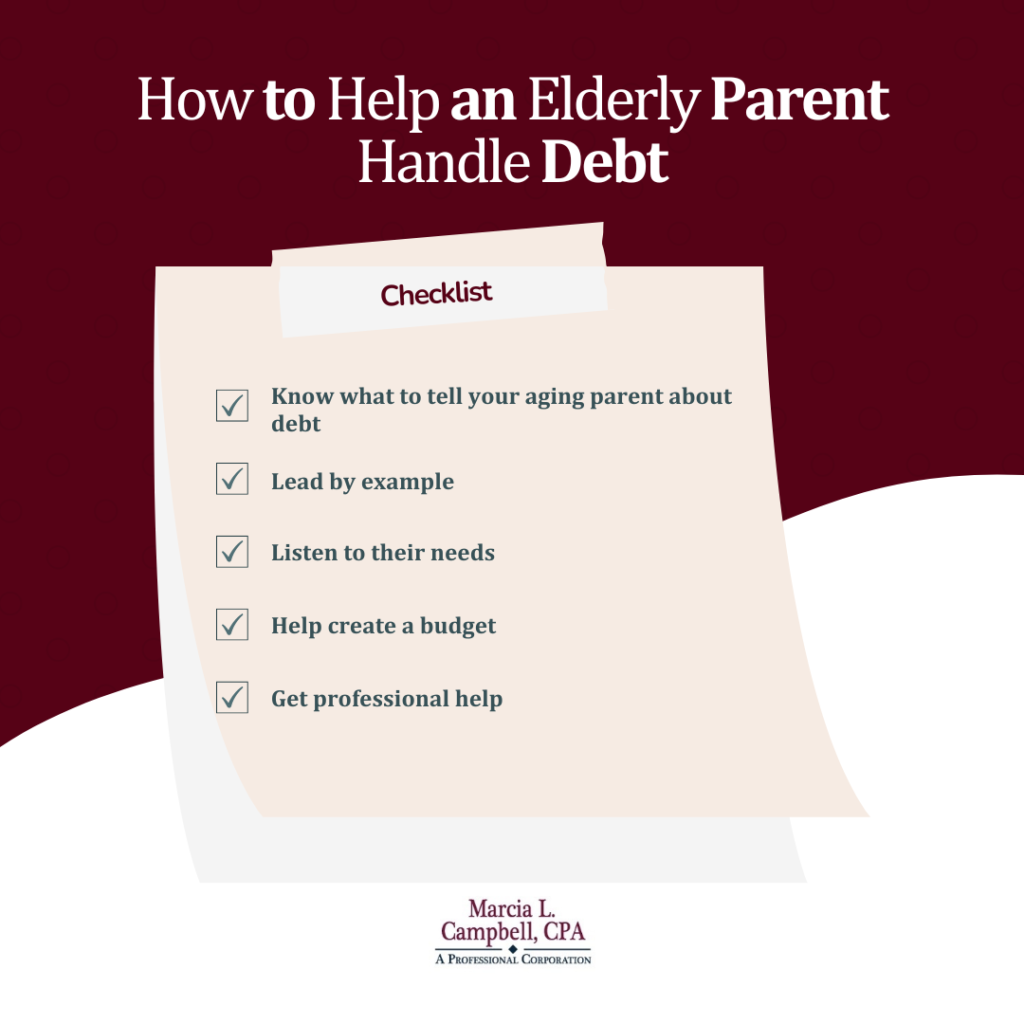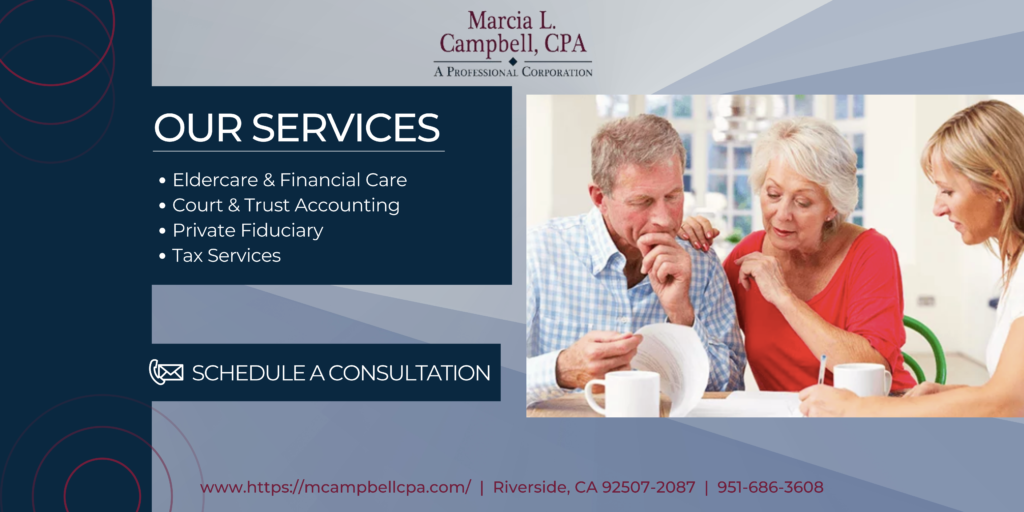Imagine your parents, who’ve worked tirelessly their entire lives, preparing to retire only to have retirement ripped away from them. For many seniors, a shadow has fallen over their golden years as mountains of unpaid debt threaten to undermine what should be a time for relaxing, traveling, and spending quality time with family. This debt could also steal your inheritance if left unaddressed. Reducing or eliminating debt is crucial in creating a viable retirement plan, so understanding how to help an elderly parent handle debt is imperative. Now, this is easier said than done, but we are here to guide you through this process.
At Marcia L. Campbell, CPA, our passion is helping seniors like your parents make the most of their retirement by helping them manage and optimize their finances. Here are crucial steps to assist your senior parent in reducing and eliminating their debt.
How to Help an Elderly Parent Handle Debt
From initial discussions to the importance of working with an attorney, there are several steps you can take to help your senior parent manage and pay down their debt. Here’s how to help an elderly parent handle debt:
- Know what to tell your aging parents about debt
- Lead by example
- Listen to their needs
- Help create a budget
- Get professional help
Related Article: What is a Trust for Elderly Parents?
Know What to Tell Your Aging Parents About Debt
The first step in learning how to help an elderly parent handle debt is starting a conversation — an open line of communication is crucial. Enter this conversation with a clear idea of what you want to express. Be honest, but emphasize that you’re concerned for their well-being.
Make sure you have plenty of time to have the conversation. If possible, plan to talk to them before debt becomes a larger issue so they can avoid pitfalls. Being as proactive as possible is key to protecting your parents’ assets and finances.
When you were a child, you used to go to your parents for advice. Now the roles are reversed. Keep this in mind and proceed with tact. Talk about how it’s common to mismanage money and sink deeper into debt using credit cards, and share personal stories of times that you yourself fell into this trap. Tell your parents you understand how stressful the situation is, but remind them that there is hope.
Talk about spending habits and how they envision their retirement. Remind them that, while debt is certainly an obstacle standing in the way of their dream retirement, it is not impossible to overcome.
If you still feel uncomfortable or awkward talking to your parents about their financial problems, try opening the discussion with a related subject. A great icebreaker could be mentioning an article or a news segment you watched about debt and life.
“If your first conversation ends in an argument or rejection, try again and avoid the hot-button topics that caused the argument. It’s normal for people to get defensive about their finances, so be patient. This is especially true with parents who aren’t usually comfortable sharing money issues with their kids. Be calm, gentle, and understanding in your demeanor. Remember, your parents probably value their independence, and pride may make them hesitant to talk and receive help at first. Be patient but stay persistent.”
– Marcia L. Campbell, CPA & Fiduciary for the Elderly
Related Article: How Do You Talk to an Aging Parent About Finances, Pt. I?
Lead by Example
As we mentioned before, a great starting point to grasping how to help an elderly parent handle debt is discussing your financial situation. If you are honest and sincere, this could be disarming and make them more comfortable opening up.
You could mention that you recently had a lawyer draft a will, create a revocable trust, and prepare documents with medical directives. Then, you could use this as a segue to ask your parents if they’ve taken similar steps while emphasizing the importance of having these documents in place.
If you have worked through debt or even have a close friend or family member who did, this could be a way to inspire your parents to confront their own balance sheet.
Leading by example extends beyond how you help your parents – you may also need to talk to your siblings and other family members. If any adult children or family members are financially dependent on them, this can put an added strain on their finances.
Be honest about the burden they are placing on your parents, and show them how you have avoided depending on them for financial help.
Related Article: How to Prepare for Taking Over Elderly Parents’ Finances
Listen to Their Needs
Your top priority when looking into how to help an elderly parent handle debt should be to ensure your parents have the means to cover necessities like food, home costs, and healthcare.
Your parents shouldn’t go without any of these things, and they also shouldn’t have to resort to racking up credit card debt to pay them. Talk with your parents about their needs and what they’re struggling with. Maybe it’s balancing their checkbook, staying on top of bills, or managing their spending.
Some ways you can help aging parents reduce or eliminate debt include:
- Offering to help balance their checkbook
- Offering to help make monthly payments
- Offering to set up appointments for home repairs or help with big purchases like a new car
- Offering to have them move in with you if they need help but cannot afford assisted living
- Cautioning them about scam artists who prey on the elderly
- Getting online access to their bank accounts and credit cards
- Trying to always be there when they need assistance
These may seem more reasonable or easier to accept for your parents. Also, smaller gestures could be the stepping stone they need to feel more comfortable asking for and accepting help.
Related Article: What Are the Financial Needs of an Elderly Person, Pt. I?
Help Create a Budget
One of the most important steps in helping a senior parent handle debt is budgeting. Budgeting should entail managing pre- and post-retirement budgets. Sometimes, to curb bad spending habits people need to see where their money is going.
Budgeting is also important if they have costly health problems and could fall into medical debt. Their budget should include food, housing, and other necessities, as well as some room for fun, like eating out, traveling, or seeing a movie.
But remember, you need to budget for now, too. You need to see your parent’s debt in its totality and tailor the budget so they can avoid adding to it and start paying it down. Start by canceling credit cards. Maybe this will require shopping at different stores or cutting down on subscriptions. Having them pay for everything they can in cash could also be useful in managing overspending.
Regardless, budgeting with a clear goal is crucial.
If repaying debt is taking up too much of your parent’s income, consider debt reduction options like debt management, debt settlement, and debt consolidation. This is one of the biggest advantages of working with a professional fiduciary who specializes in finances.
A fiduciary can help determine the best course of action in reducing debt while keeping long-term goals in mind. For example, if your parents have a mortgage, it may have some tax benefits in retirement that make addressing that source of debt less of a priority.
Related Article: How Do I Monitor My Elderly Parents’ Finances?
Get Professional Help
You already have a job, family, and other personal obligations. From managing multiple streams of retirement income, to optimizing their tax situation, to helping them budget, to protecting them from scams to ensuring they are staying on top of bills, this undertaking is daunting.
Helping a senior parent reduce or eliminate debt so that they can make the most of their retirement is a full-time job requiring considerable financial expertise and experience. When you hire a professional fiduciary, they can help with daily money management and more.
A professional can even guide them through setting up a trust or crafting a financial power of attorney to ease this process. They could also help your parents negotiate with credit agencies and receive a lower interest rate while prudently combining and simplifying debt.
It may seem counterintuitive to spend money on elder care financial services to get out of debt, but optimizing your senior parent’s financial situation is the only way to help them reduce and eliminate debt so they can enjoy the retirement they deserve.
Related Article: Private Fiduciary for the Elderly: How They Work
Do You Need to Help an Elderly Parent Handle Debt? Work with a Professional Fiduciary.
If the specter of insurmountable debt is hanging over your parent’s retirement like an ominous storm cloud, it is crucial to take steps to help them reduce or eliminate their debt. While there are several steps you can take, working with a professional fiduciary and CPA for seniors is the best option available when determining how to help an elderly parent handle debt.
Contact a professional fiduciary for seniors today for help.



